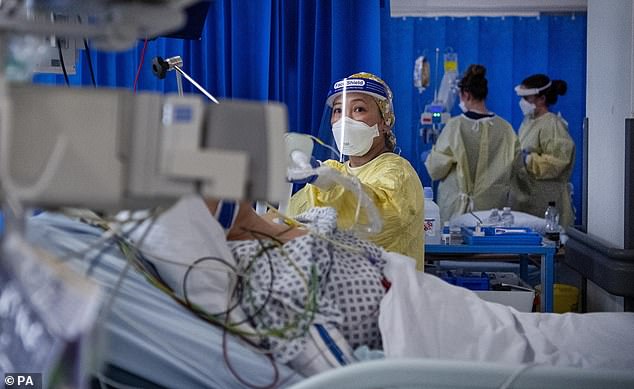A single gene could determine if catching Covid will send you to ICU or not, a new study has suggested.
Experts from the MRC-University of Glasgow Centre for Virus Research have found why some people are naturally more resistant to the virus than others.
They found that people with a prenylated version of the OAS1 gene, which has been linked to having Neanderthal ancestry, have better protection from Covid.
Prenylated is a term meaning the protein associated with the gene has an additional molecule of fat attached.
The scientists found the prenylated version of OAS1 is better at spotting the Covid virus, sounding the alarm to the body’s immune system that it is under attack.

Scientists found that Covid patients without a the ‘good’ version of the OAS1 gene were 1.6 times more likely to end up in ICU or die than those lucky enough to have it
The scientists analysed the genetic data of 499 hospitalised UK Covid patients, and found those without the prenylated version of the OAS1 gene had a greater chance of being sent to ICU for treatment, or dying.
They found that Covid patients without the fatty version of the OAS1 gene were 1.6 times more likely to be sent to ICU or die.
Academics told MailOnline that 60 per cent of people of English or Scottish descent carry a form of the gene.
This genetic protection from Covid is likely to have helped scores of people avoid a severe case of the disease before vaccines started to become available.
But while the discovery is good news for those who may have the prenylated version of OAS1 gene, the announcement came with a warning.
Professor Sam Wilson, one of the study’s authors, highlighted how the coronavirus that caused the SARS outbreak in 2003, which is related to Covid, adapted to evade the prenylated version of OAS1 gene.
He said: ‘If Sars-CoV-2 variants learn the same trick, they could be substantially more pathogenic and transmissible in unvaccinated populations.
‘This reinforces the need to continually monitor the emergence of new Sars-CoV-2 variants.’
The scientists also said that Covid’s current weakness to the prenylated version of the OAS1 gene in humans may give us clues to the origin of the virus.
One of the presumed theories behind the origin of Covid is that it started out as a virus among horseshoe bats.
While the prenylated version of the OAS1 gene is common in the animal kingdom, horseshoe bats are an exception having lost it about 55-million-years-ago over the course of their evolution.
The fact Covid is vulnerable to the prenylated version of the OAS1 gene suggests it originated in a species lacking this defence.
Professor Wilson said: ‘Cross-species transmission to humans exposed the virus Sars-CoV-2 to a new repertoire of antiviral defences, some of which Sars-CoV-2 may not know how to evade.’
The study was funded by the Medical Research Council, Wellcome, and UK Research and Innovation.
Could the microorganisms living in your nose protect you from Covid?
New research suggests that the ecosystem of tiny organisms that live in your nose and throat could determine how ill Covid could make you.
Scientists at the Augusta University Medical College of Georgia in the US recently examined the impact of the community of microscopic organisms that live in the human nose and throat, called the microbiota.
The researchers compared the microbiota of 27 people who did not have Covid, 30 who were had the virus but had no symptoms, and 27 people who were positive with symptoms.
They found half of patients with Covid symptoms had had their microbiota ‘wiped out’.
This compared to only two individuals in the non-Covid group and and four individuals in the asymptomatic group with a similar low amount of microorganisms in their nose and throat.
One of the authors of the paper Dr Sadanand Fulzele, admitted in the journal Diagnostics that they did not know if the virus had wiped out the microbiota or if a lack of microbiota had made people vulnerable to the virus.
However the authors added that the data they had collected suggested a ‘strong association’ between the nasal microbiota, and Covid infection and disease severity.
The scientists said more research needed to be done on this topic and they were planning to apply for funding to explore the subject.
Advertisement
Source link : https://www.dailymail.co.uk/news/article-10040615/Some-people-gene-offers-protection-Covid-experts-say.html











